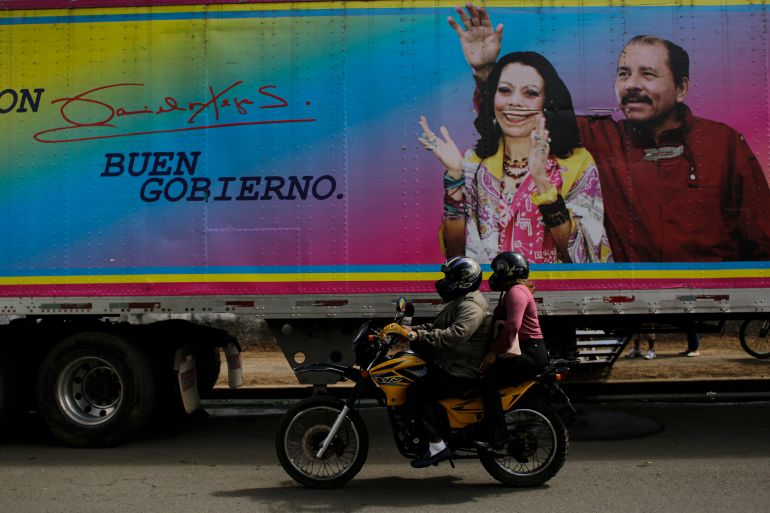US Congress targets Nicaragua ahead of controversial polls
Foreign governments have targeted President Daniel Ortega amid a months-long crackdown on the opposition.

The United States Congress has approved legislation to sharply increase diplomatic pressure on the government of President Daniel Ortega in Nicaragua, the latest move by a foreign government towards squeezing Managua ahead of controversial elections this weekend.
The so-called RENACER Act was adopted by 387 votes in favour and 35 against in the US House of Representatives on Wednesday. It had been approved by the full Senate in August.
Keep reading
list of 3 itemsNicaragua police arrest editor of newspaper critical of Ortega
Nicaragua cancels permits for US, European NGOs
The bipartisan legislation provides an arsenal of measures to address what Washington considers to be corruption and human rights abuses by the government of Ortega and his wife Rosario Murillo, who is also his vice president and running mate. The government has been accused of overseeing a months-long crackdown on the opposition ahead of the polls on Sunday.
The bill will now head to the desk of US President Joe Biden, who can either sign or veto the legislation.
The measures include increasing – in coordination with Canada, the European Union and Latin American and Caribbean countries – a number of US sanctions against people involved in human rights abuses and the obstruction of free elections.
In addition, the legislation expands the supervision of loans from international financial institutions to Nicaragua, and calls for a review of Nicaragua’s participation in a free trade pact among the US, Central America and the Dominican Republic.
It also adds Nicaragua to the list of Central American countries subject to visa restrictions for corruption, and requires more intelligence reports on the Russian government’s activities in the Central American country, including reports on Russian military sales to Managua.
“We are witnessing the worst authoritarian assault on democracy in Latin America in decades,” Senator Bob Menendez, the chair of the Senate Foreign Relations Committee, said in a statement on Wednesday, “and I am proud to lead this effort for Congress to act decisively so the Ortega-Murillo regime knows there will be major consequences for the pseudo coronation of their dynastic dictatorship.”
Senator Rubio, @SenatorMenendez, @RepSires, & @RepMariaSalazar applauded the U.S. House of Representatives’ passage of their bill, the Reinforcing Nicaragua’s Adherence to Conditions for Electoral Reform #RENACERAct (S.1064). #SOSNicaragua 🇳🇮🇺🇸 https://t.co/2Qy9PtiMuX pic.twitter.com/UrAwpmjp99
— Senator Rubio Press (@SenRubioPress) November 3, 2021
The vote on Wednesday comes as a group of leading human rights groups, including Amnesty International and Human Rights Watch, have slammed Sunday’s elections, citing an atmosphere of repression, forced disappearances and restrictions on civil and political liberties.
The elections “do not guarantee human rights”, said the NGOs in a report in which they urged the international community to “redouble their efforts to end the crisis” in the Central American country.
Cannot expect ‘legitimate’ result
Ortega, 75, will be seeking a fourth successive term after 14 years in power.
About 40 opposition figures, including seven presidential hopefuls, have been arrested since June.
Massive protests erupted in 2018, calling for Ortega’s resignation. Hundreds of people have since been killed in the resulting violence.
In their report, the human rights organisations cited arbitrary detentions and forced disappearances and noted that “100 people perceived as critical remain in detention”.
They also expressed concern about “the lack of judicial independence and violations of the right of access to justice”.
The report came a day after EU foreign policy chief Josep Borrell branded President Ortega a “dictator” staging “fake” elections at the weekend.
“Mr Ortega has occupied himself imprisoning all the political contenders who have presented themselves to run in these elections and we cannot expect that this process will yield a result we can consider legitimate. Quite the opposite,” Borrell said on a visit to Lima, Peru.
“The situation in Nicaragua is one of the most serious in the Americas at the moment,” Borrell said.